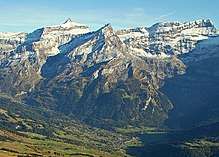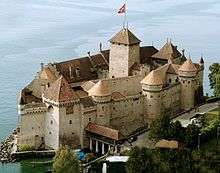Vaud
Cities
- Lake Geneva
- 🌍 Montreux — the jewel of the Swiss Riviera
- 🌍 Nyon — pleasant town centre with thriving Sunday flea market
- 🌍 Palézieux
- 🌍 Vevey — Small city in the midst of the Swiss Riviera, corporate headquarters of Nestlé

- Vaud Alps
- 🌍 Aigle — a jumping off point for the Vaud Alps, with a very cool castle
- 🌍 Château-d'Œx
- 🌍 Les Diablerets — ski/hiking resort town in the Vaud Alps
- 🌍 Leysin — spa and college town with good skiing in the Vaud Alps
- 🌍 Villars-sur-Ollon – good ski resort for beginners and families
- Vaud Jura
- Central Plateau
Other destinations
Understand
The public holidays are different in each canton. These are the public holidays in addition to those observed in the whole of Switzerland:
- St. Berchtold (2 January)
- Lundi du Jeûne (Monday after the third Sunday of September)
Talk
Vaud is entirely French speaking, though you will also hear some Swiss German, Italian, and English. While it might be hard to get around the country side without speaking French, Lausanne is much more international and it is not uncommon for people around you to be having conversations in four different languages.
Get in
By plane
Geneva airport is near the western part of the canton, about 25 km southwest of Nyon, 60 km from Lausanne and 90 km from Montreux. From the airport station, half-hourly interregio trains take you to Nyon in 25 minutes, to Lausanne in 50 minutes, to Montreux in 1:15 h, to Aigle in 1½ hours. For the northern part of the canton, Berne airport may be closer (45 km to Avenches, 90 km to Château-d'Œx), which is however a much smaller airport, offering only a limited choice of international connections. From Zurich Airport, Switzerland's most important air hub, there are direct intercity trains to Lausanne, taking 2:20 hours.
By train
Vaud is accessible via the well-developed rail network of the Swiss Federal Railways (SBB). The canton's most important rail hub is in the capital Lausanne, which is served by intercity trains from Geneva, Fribourg, Berne, Zurich and St. Gallen (some trains on this line also stop in Nyon and Morges); St. Gallen, Zurich or Basel and Delémont, Biel/Bienne and Neuchatel via Yverdon. From Geneva to Lausanne, it takes 35–45 minutes, from Berne a bit more than an hour, from Zurich and Basel two or 2½ hours.
Moreover, there are regular Italian Eurocity trains from Milan to Montreux (three hours) and Lausanne (3:20 h). A few trains even run all the way from Venice (6:20 h) and Verona (5:10 h) to Lausanne. From Paris, there are direct high-speed trains (TGV) to Lausanne (via Dijon, Dole) several times a day, taking 3:40 hours.
The Vaud Alps are accessible with the interregio line Geneva–Lausanne–Montreux–Aigle–Saint-Maurice–Sion–Brig or the Schnellzug line Montreux–Château-d'Œx–Gstaad–Zweisimmen.
Get around
See

- Take a boat from Montreux to see the iconic Chillon Castle. This is probably the most famous castle in Switzerland and stands prominently on a rock on the lake.
- La Sarraz Castle, located in a small village (also named La Sarraz) 20 minutes by train from Lausanne. A recognised site of European Heritage, the current castle dates to the 16th century and stands out as quite unique architecturally.
Do
Eat
- Chocolaterie Tristan: In Bougy-Villars, a cute little village half-way between Lausanne and Geneva, one shouldn't miss this little artisanal chocolate factory. Unique chocolates with all sort of original flavours such as spice, tea, olive oil, and many more, are prepared here. You can get there by bus from Allaman (IKEA train stop). On the way, you will enjoy a beautiful view of the mountains and the surrounding vineyards. Once in the village, let the scent guide you to the shop. And by the way, why not stop in Féchy (the neighbouring village) to taste some famous local wine.
Drink
Stay safe
Go next
- Geneva, to the west
- Valais, to the east
- Berne Region, to the north
- Haute-Savoie, across the lake
- Franche-Comté, neighbouring region in France